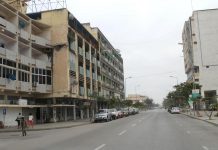Africa-Press – Angola. Today we fight to the last man! “, Shouts a fan towards the seat shortly before the start of the game. One of his colleagues has hung a banner on the small grandstand on which he is standing with the slogan:” Chasing the Dream ” Chasing a dream. “No surrender!” Shouts another. And there is laughter. War and fun, parents of young children often tell each other, can be close together. This wisdom also seems to have reached the Freetown football fields.
A Sunday at the end of October. “People! Remember where you come from!” Shouts the coach into the circle that his players and supervisors formed shortly before kick-off. “Johansen!” They yell back in one voice. Right in front of the small grandstand, you can hardly hear the roaring street noise behind the flat concrete wall. A few spectators start to create a good mood. After all, it’s against Central Parade – a contender for the championship. “Today’s game is extremely important to stay at the top of the table,” said press spokesman Kemoh Sesay on the sidelines and has to yell against the loud instructions of the coach, who is electrified from the first minute. “We want to play in continental business so that our income increases and we can invest more.” Currently it is only enough for ninth place, but due to various shifts in the midst of the pandemic, the table is not very meaningful. You have already made it to the international ranks. “We have to tell the story of FC Johansen. All over Africa!”
The story behind the club that Kemoh Sesay works for is indeed a special one. It begins with destruction and disorientation, and has meanwhile reached considerable successes and great hopes. And who knows where it will lead to. When the Africa Cup of Nations begins in Cameroon on January 9th, players from FC Johansen should also be there. For the first time in a quarter of a century, Sierra Leone has qualified for the continental tournament. Without Johansen, it might not have succeeded. When an eleven-year civil war ended in January 2002, the West African country had lost 70,000 people. A conflict had been brought in from neighboring Liberia and it soon spread. The fighting lacked an ideological basis, but the diamond deposits continued to fuel it for years. Rebels challenged the government and other groups. Soon all measure was lost. Even children were armed and participated in street fights. 2.6 million people lost their homes, and even more were wounded or amputated by machetes.
The intervention of international troops brought about peace, but many problems were not over yet. Also because hardly any child went to school regularly in those years, Sierra Leone is still lagging behind its possibilities in terms of level of development. But there were bright spots. “I was a child shortly after the war. We used to meet on the street every day and play with a ball made of tatters,” says Abu Bakarr Bah, the club’s kit manager. “Many of us lost parents or siblings in the war. Some were also involved in the war in some way.” Instead of going into more detail, the 34-year-old tells the story that one hears from so many poor areas of the world: Football was the game that distracted losers, made them happy and produced winners. Soon Abu Bakarr Bah and his friends had regular spectators. “Whenever her car came closer, we already knew that she was bringing us something. One day it was drinks, at some point a ball and real football boots. And then everything started.”
Isha Johansen, a wealthy woman, founded FC Johansen in 2004. At first it was just a youth project so that the children could devote themselves to football and go to school. But with the boys, so too did the project. In the junior division, the players of FC Johansen won international tournaments, and when the first class reached adulthood, the patron Johansen registered her club in the men’s division.
Beginning of the boom
Soon the promotion to the national Premier League succeeded, so far once the cup victory. “I played for the club until 2010,” says Abu Bakarr Bah, grabbing his round stomach and laughing. “Today I couldn’t keep up.” With the rise of FC Johansen, its namesake also became famous. “Madame Isha”, as she is called here on the field, rose nine years later to become the first female president of the national football association. Since then, observers have reported that youth development has become more professional and that professional business has stabilized. Critics have also accused it of corruption. She was not available for an interview.
Isha Johansen is now a council member of Fifa, where the picture book-like career of the 56-year-old is often emphasized. In several countries around the world there are similar examples of the power of football, which, with good will, can sometimes achieve much more than initially intended. In the Bolivian city of Santa Cruz, the idealist Rolando Aguilera founded the Tahuichi Academy to get children away from drug use and get them to exercise. Today Tahuichi is a sports internet that forms the backbone of the Bolivian youth development. The homeless World Cup has been held every two years since 2003. Initially, it should point out the problem of people on the street. In the meantime the event has expanded and is funded with millions of sponsorships.
However, FC Johansen has a special position. “It’s really great what this club is doing,” said Augustus Lawson. The thin 70-year-old man stands calmly on the sidelines, between the fans on both sides, and watches the game. Lawson used to be a national player for Sierra Leone. “When I was young, we used to be a strong footballing nation. The war ruined so much. None of the children went to school. Of course, you didn’t train anymore.” But now it’s getting better. The qualification of the national team for the Africa Cup is proof. Football is also the most popular sport in this eight million country, which according to the United Nations is one of the poorest in the world.
Basic structures are still missing. Due to a lack of a stadium, the two first division clubs Central Parade and FC Johansen had to move to a pitch that is so bumpy that hardly a flat pass is played cleanly this Sunday. Only a few hundred visitors fit on the system. There is no running water in the toilets, and at the entrance on the street it is difficult to check whether the entrance fee of 10,000 leons (around 80 cents) has actually been paid. “Normally we would play in front of up to 50,000 spectators in the national stadium,” Kemoh Sesay assured before kick-off.
In fact, FC Johansen, a symbol of overcoming the civil war, is one of the most popular clubs in the country. Because whether you support him athletically or not: In a certain way, almost everyone is a fan. You can see it in the peacefulness with which people treat each other two decades after the devastating conflict that most of them have experienced here . “The war is a thing of the past, nobody thinks about it anymore. We are over with that,” said Abdul Karim Fofanah, the unmistakably loud coach, in a hoarse voice after the final whistle. “Back then I was protecting my neighborhood with the Civil Defense Force. But when I see someone who fought my area back then, it doesn’t matter anymore. Things like football help us to
This Sunday it doesn’t look good for FC Johansen. After a counterattack, the guests of Central Parade win 1-0. A heavy defeat in the fight for the top places in the table. “We didn’t find our way into the game today. We weren’t well organized today,” complained Abdul Kamara, the team captain. “But at least a few of our youngsters watched. I hope they saw what we were lacking.”
At FC Johansen, you don’t just think from game to game, but also in the long term. When Abdul Kamara, who, like many others here, was involved in the war as a child, ends his career, he will want to become a coach. “I want to train the next generation. That is also good development work for everyone.” Because if you play together or against each other, Abdul Kamara believes that you will not fight each other later. At FC Johansen you know this very well.a
For More News And Analysis About Angola Follow Africa-Press






